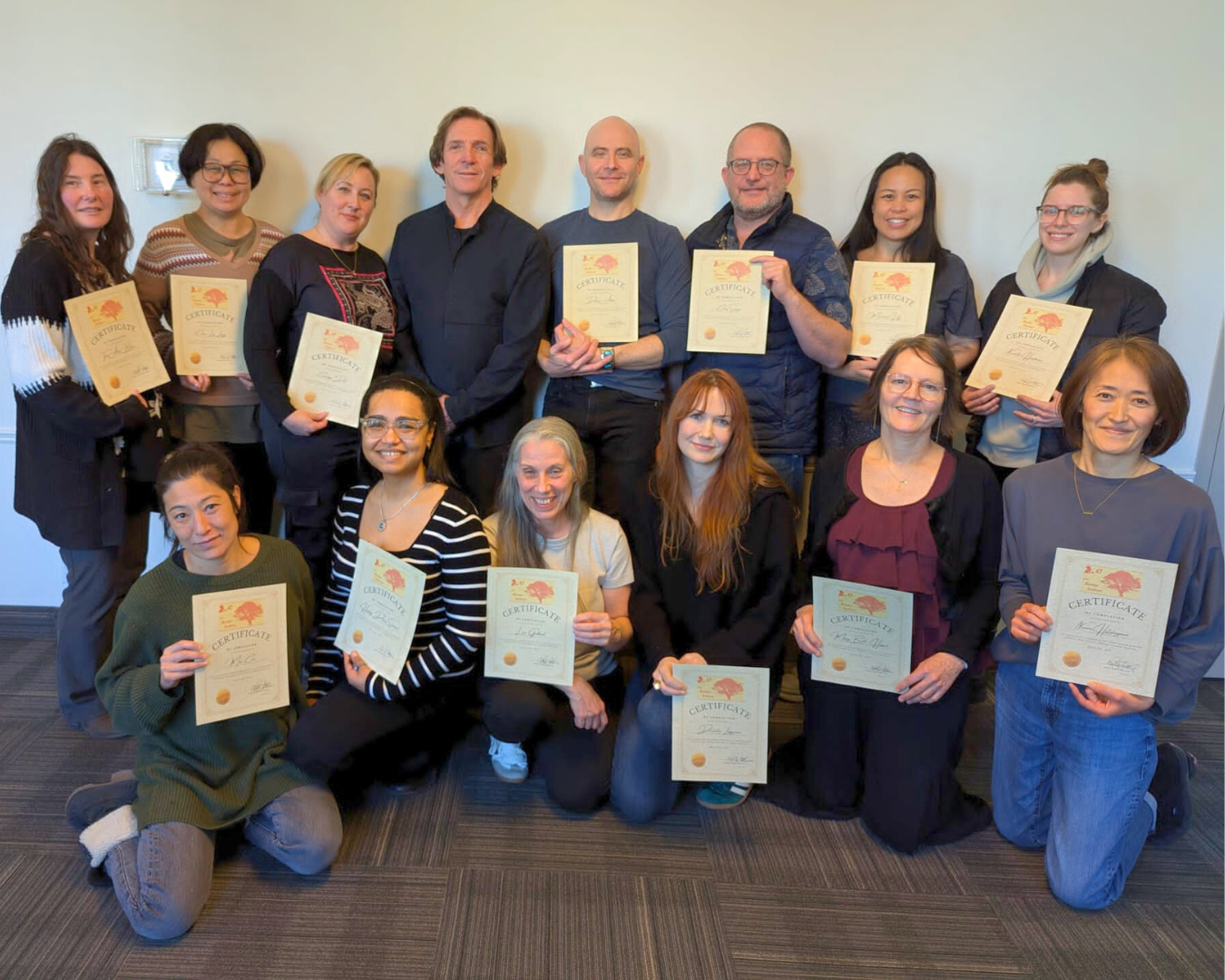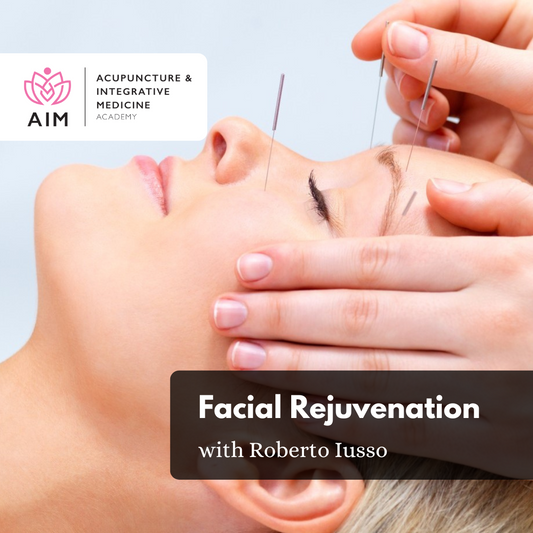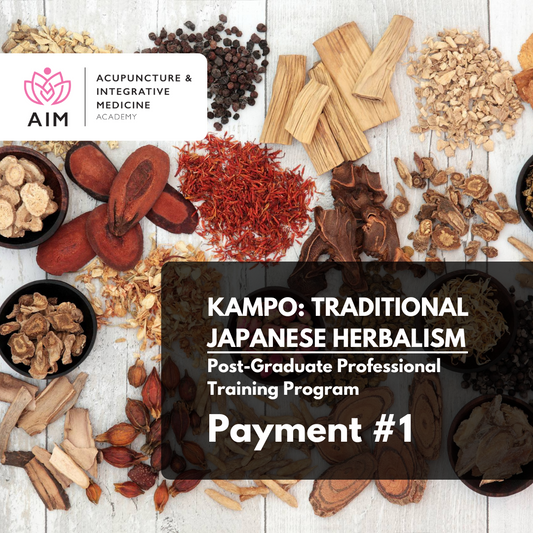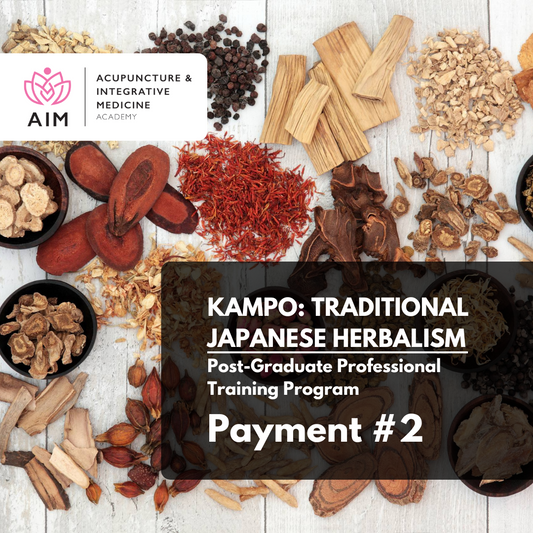Acupuncture & Integrative Medicine Academy
Fukushin: Abdominal Palpation in The Kampo Tradition with Nigel Dawes – Last Time Running
Fukushin: Abdominal Palpation in The Kampo Tradition with Nigel Dawes – Last Time Running
Stay Tuned!
Couldn't load pickup availability





This is the final time we’ll run this workshop — register now to secure your spot!
Please note, this seminar delves into Fukushin: Abdominal Palpation, one specific technique within the Kampo Tradition. This workshop provides a great introduction for anyone interested in exploring Traditional Japanese Herbalism deeper.
Testimonial
"What a great workshop! Even after finishing school and writing the board exam, I wasn’t always sure I was prescribing the right formula. Now, after just one weekend (and a little extra reading), I have usable and practical tools to aid in diagnosis and prescribing, which will lead to better and faster outcomes. Nigel Dawes has a wealth of knowledge and experience and his style of instructing is an excellent blend of theory and practice." - Laura Shin, R.TCMP
Enjoy this video demonstration of Fukushin from Nigel Dawes!
Details:
Schedule
From Friday, January 16th to Saturday January 17th, 2026 from 9:00AM - 5:00PM
Regular Cost: $750
40 Years of AIM - Special Rate: $500
This is the final time we’ll run this workshop — register now to secure your spot!
Location: In Person at AIM Academy
- Payment can be made online by Visa or MasterCard
- In person using Visa, Mastercard, or interac
- Via e-transfer to info@aim-academy.ca
Registration
Register online through our Shopify store or over the phone by calling 416 323 1818 ext. 200. Registrations are taken on a first come, first serve basis. Register early to avoid disappointment.
Cancellation Policy
Cancellations made by the student on or before two weeks prior to the course start date will result in a $50 + HST cancellation fee. Student cancellations made after that date will not receive a refund.
A certificate will be issued at the end of the course.
Description:
This 2-day workshop introduces the history of Fukushin (Abdominal Diagnosis) and provides a context for its use and application in herbal practice. It also introduces the historical trajectory in which the Kampo system has evolved in the manner it has, leading to its current relevance in contemporary healthcare.
A primary component of the workshop is the demonstration and practice of the Fukushin diagnostic method. Students will learn a specific exam sequence or “kata” involving precise locations, depths and qualities of pressure. An additional component will allow students to begin to associate Fukushin findings directly with Herb Formula Families matching diagnosis with treatment in a “lock-and-key” fashion.
There will also be diagnostic work-ups by the instructor, allowing students to witness the entire Kampo process from palpation to Prescription. The emphasis of this workshop is on developing the practical palpatory skills necessary to include Fukushin findings in clinical decision-making in herbs.
Important: This will be the final time we offer Fukushin: Abdominal Palpation in The Kampo Tradition at AIM. Nigel Dawes’ Jan 16–17, 2026 session is the last scheduled workshop for this topic — if you’ve been meaning to study Fukushin with Nigel, now is your opportunity. Spaces are limited and registration is first-come, first-served.
Overview of Topics - Day #1
- Introduction, background and history of Fukushin in Japan
- The relevance of Fukushin in modern practice
- Fukushin Demonstration / palpation / basic kata
- Describing the findings and how to chart them
- Practical: exam technique and comparison of findings with partners
- Importance of SHO
- Otsuka’s 13 abdominal conformations:
- Description of morbid state
- Pairwork practice
- Case study work-up in class by instructor
Overview of Topics - Day #2
- Otsuka’s 13 abdominal conformations:
- Review of basic 13 abdominal conformations
- Interpretation of findings
- Example formula matching with findings
- Constitutional considerations in diagnosis and treatment
- Presentation of complex abdominal findings
- Pairwork practice
- Case study work-up in class by instructor
- Student mock work-up with supervision
Who is the Course Aimed At?
- Practitioners of Traditional Chinese Medicine who wish to improve and broaden their existing herbal knowledge & palpatory skills
- Current senior students of Traditional Chinese Medicine
- Naturopathic Doctors and Herbal Practitioners from other traditions
- Acupuncture Practitioners
- Shiatsu, Tui Na and other Massage Practitioners
- MD, DO, NP, Chiropractors & other Allied Health Professionals
Educational objectives:
- Establish why Kampo has evolved in the way it has and why that is relevant for Modern Herbalism - the history explains why the system works
- Identify Pitfalls: Allow students to recognize why so many people struggle with herbal prescription and practice.
- Build Confidence: Allow students to develop confidence so that they are more likely to come up with effective formulas.
- To demonstrate the practical, physical, and direct nature of the Kampo Herbal System.
- To distinguish Kampo as a distinct (not better) system from Traditional Chinese Medicine
- To provide students with the practical ability to perform the Fukushin Diagnostic method.
- To provide students with the ability to broadly interpret their Fukushin findings according to matching Kampo Formula Families.
About Fukushin
The abdomen represents the body's anatomical center, housing as it does the vital organs as well as forming its myofascial and structural core. In Asian systems of medicine, it is also the source of vital energy acting as a crucible for the mutual transmutation of acquired and pre-natal essence. It also represents a metaphysical cauldron in which the vital organs play a pivotal role, each acting as repository and catalyst for specific manifestations at the psychic and emotional level.
Throughout the history and development of Traditional Asian Medical systems the abdomen has thus occupied a pivotal role in both diagnostic and treatment paradigms. In more recent times however, its significance in the clinic has dwindled and many practitioners, especially in modern China, rarely use it in practice. This has not been the case in Japan where, from the Edo Period in particular, Acupuncturists as well as Kampo and Shiatsu practitioners have each developed highly sophisticated methods of using the abdomen in assessment and practice.
One such traditional method is that employed by modern herbalists (mostly MD’s) in Japan who use a detailed and highly specific form of abdominal palpation to obtain information which strongly influences the selection of herbal prescription.
This workshop will present one of these methods of abdominal palpation currently practiced within the Kampo tradition as developed by Otsuka Yoshinori during the last century. Each abdominal conformation will be presented and discussed from the perspective of practical herbal prescribing. A strong practical component will ensure that the participants leave the workshop with a firm grasp of the basics of how to obtain and interpret these abdominal findings.
Requirements:
This course is for anyone with a solid foundation in Eastern Medicine such as; TCMPs, Naturopaths, Western Herbalists, and anyone interested in and learning about abdominal palpation and traditional Japanese Herbalism.
Please note that this seminar is a part of a future series of the Kampo Tradition. This seminar is a spectacular introduction to anyone interested in the therapeutic tradition.
Instructor: Nigel Dawes, M.A. (Cantab.), B.Ac.C., R.C.H.M., N.C.C.A.O.M., L.Ac.

Nigel Dawes has been practicing and teaching Oriental Medicine for 40 years. He lived and studied in Japan for 5 years followed by hospital internships in China before returning to the UK where he opened a practice and founded his own Shiatsu school in 1987. He moved to the US in 1993 and has been involved variously in undergraduate and graduate OM education, higher education administration and political work in the field, clinical practice and publications including numerous articles, 2 books on Shiatsu, and 2 books on Kampo.
He has served on faculty at both Pacific College of Oriental Medicine and Tristate College of Acupuncture and is the founder and director of the New York Kampo Institute (NYKI) whose mission is to disseminate the teaching and practice of Japanese traditional medicine in the US and internationally. Its flagship program, the Kampo Internship, is an 8-module, 2-year training in Kampo Herbal Medicine.
Assistant Instructor: T'agyol Daniel Adler, R. Ac, R. TCMP

With African roots and Canadian branches, T’agyol Daniel Adler has been offering Traditional Asian Medicine treatments in Toronto for the past 24 years. Trained in Zen Shiatsu, Acupuncture and Kampo (Japanese Herbal Medicine) he is proud and excited to be teaching this Shiatsu Introductory Programme.
In clinic, Daniel works with a wide range of conditions ranging from musculoskeletal pain and stress to more specific concerns around digestion and menstruation. He also has a large amount of experience treating martial artists and athletes and the injuries that they endure. Daniel is known for his ability to connect deeply with his patients and for his strong commitment to facilitating healing on all levels of his patients’ being.
As an instructor, Daniel is known for his enthusiasm for Zen Shiatsu and his ability to make the work practical and accessible for his students. He strongly believes that Zen Shiatsu is a constantly evolving and living practice which derives it’s strength and beauty through simple, fundamental techniques and strong, heartfelt connection.
Testimonial

"I've been asked many times by my colleagues to explain what Kampo is. As a Japanese person, I see Kampo and TCM as essentially sharing the same root, though having developed over many centuries different approaches in both their diagnostic and treatment methods.
In this program, Nigel provides in-depth instruction on over one hundred commonly used herbal formulas, supplemented by Kampo-specific information, such as abdominal diagnosis and patient constitutional analysis. This comprehensive approach greatly aids in accurate diagnosis and efficient selection of herbal formulas. In the 8 x 3-day module program (24 days over 2 years), participants study theoretical and practical aspects of Kampo on days 1 and 2 and then invite their own patients on the third day of each module to act as case studies in a Grand Rounds setting. Not only are Nigel's opinions and advice valuable, but the other experienced participants also share their diverse perspectives, experiences, and techniques, which are also very helpful.
Because we attend all 8 modules in the program with the same group, we have a unique chance to build strong relationships and become valuable resources for one another in learning the Kampo system. It's nearly impossible to find a teacher as experienced as Nigel, who is not only proficient in Kampo and Chinese herbal medicine but also in acupuncture and shiatsu. I strongly encourage you to participate in this Kampo professional training program." - Nozomi Hatakeyama, R. TCMP, R. Ac
Check out these workshops!
-
NEW WORKSHOP: Rectifying Systemic Imbalances through the Center - Abdominal Treatment Workshop with T'agyol Daniel Adler
Regular price $600.00 CADRegular priceUnit price per -
Facial Rejuvenation with Roberto Iusso
Regular price $700.00 CADRegular priceUnit price per -
Kampo - Payment #1
Regular price $750.00 CADRegular priceUnit price per -
Kampo - Payment #2
Regular price $750.00 CADRegular priceUnit price per










